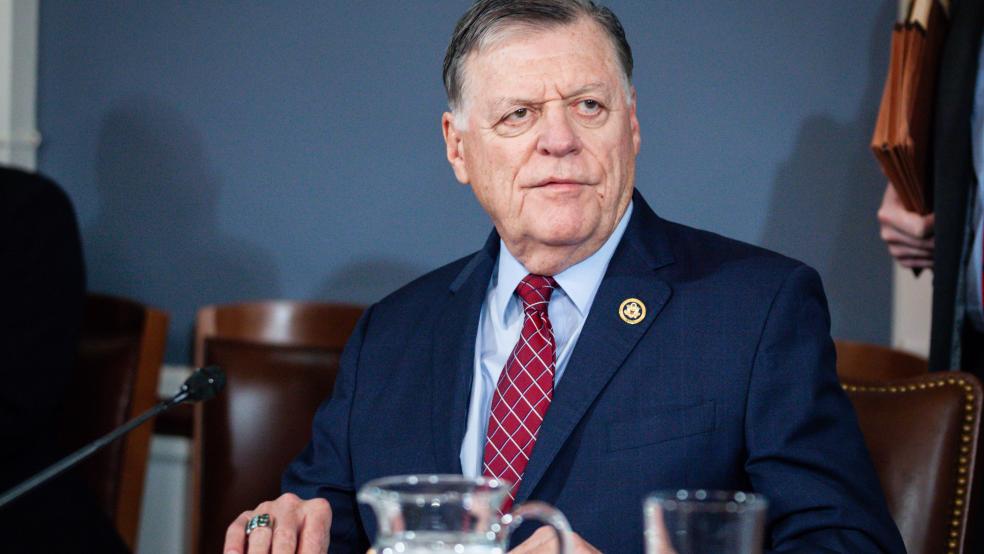House Republicans are speeding ahead with plans to pass spending bills for fiscal year 2025 on an aggressive timetable — and in a fashion that sets up another clash with Democrats, much like the prolonged and problematic process for 2024.
The House on Wednesday passed its first funding bill for fiscal year 2025, approving a GOP spending plan for military construction, Veterans Affairs and related agencies largely along partisan lines. The measure would provide $147.5 billion in discretionary funding and just over $231 billion for mandatory programs, for a total of $379 billion.
“The bill provides robust funding for military construction projects, with a particular focus on the Pacific region and military family housing,” Republican House Appropriations Chairman Tom Cole said during floor consideration of the measure. “Even more importantly, the legislation provides full funding for health care and benefits for our nation’s veterans.” Cole said that the bill keeps to budgetary levels set under last year’s bipartisan Fiscal Responsibility Act but would deliver $400 million more than the president requested.
The spending bill covering veterans’ benefits and military construction traditionally draws significant bipartisan backing, yet this one was approved by a margin of 209 to 197, with just four Democrats voting in favor of the bill and just two Republicans voting against it. Democratic leaders urged their members to oppose the bill, which they denounced as extreme in large part because of Republican efforts to limit access to abortion and reproductive care. “Today, they’re telling 2 million women veterans that, if they need an abortion to save their life, the VA should turn them away. That MAGA ideology matters more than our veterans’ health, their freedom, even their survival,” Democratic Whip Katherine Clark of Massachusetts said.
Democrats also warned that the bill would worsen quality of life for military families by cutting military construction $718 million below last year’s level and excluding climate change funding.
“It is a shame that Republicans are more interested in passing messaging bills than actually getting this important funding bill signed into law,” said Rep. Rosa DeLauro of Connecticut, the top Democratic appropriator. “With minor changes, we could find a reasonable compromise that everyone could support, but Republicans are more focused on limiting women’s access to abortion and filling their funding bills with extreme, harmful policies than working together to guarantee there is not a lapse in funding the programs that hardworking Americans depend on.”
The White House has already said President Joe Biden would veto the bill if it reaches his desk.
Other House appropriations bills advancing: The Defense appropriations bill and the one covering Financial Services and General Government both advanced out of their subcommittees. The Financial Services bill provides $23.6 billion in non-defense discretionary spending, including a $2.2 billion (or roughly 18%) cut in IRS funding. It would also wipe out funding for the IRS’s new Direct File program, which enables many taxpayers to file online for free. The bill “prohibits funds to be used for the IRS to create a government-run tax preparation software that Congress has not authorized.”
The Biden administration said that the GOP proposal sides with rich tax evaders. “House Republicans’ proposal would increase the deficit by allowing wealthy and corporate tax evaders to avoid paying taxes owed, while increasing costs for many American families by blocking a free IRS tax filing option funded by President Biden’s Inflation Reduction Act,” Treasury Department spokesman Haris Talwar said in a statement to news organizations.
What’s next: Republican leaders are pushing ahead with their spending bills, which include a $9 billion increase for the Pentagon and significant cuts to domestic spending as well as “poison pill” policy riders that Democrats won’t accept.
“Cole, [House Speaker Mike] Johnson and House Majority Leader Steve Scalise insist they’re open to a deal. Just not right now,” Punchbowl News reported this morning. “Even House GOP appropriators — while supporting Cole’s plan — admit it probably won’t work. They also acknowledge that GOP hardliners will be upset when Johnson and the GOP leadership can’t deliver the spending cuts they’re promising now.”
The bottom line: Republicans are plowing ahead with their partisan plans for now, looking to maximize their leverage for when negotiations get underway. But they could still face intraparty clashes over some of their bills and they will ultimately have to deal with Democrats to get spending bills through the Senate. Much of the fighting will be pushed off until after the November elections determine the balance of power in the capital.





